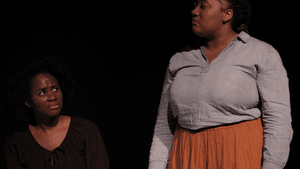Stay in the Loop
BSR publishes on a weekly schedule, with an email newsletter every Wednesday and Thursday morning. There’s no paywall, and subscribing is always free.
Free at Last
Pulley & Buttonhole presents Lynn Nottage's 'One More River to Cross: A Verbatim Fugue'

Lynn Nottage's script for One More River to Cross: A Verbatim Fugue was penned a decade ago, but not produced until director James Jackson teamed with Pulley & Buttonhole Theatre Company. The timing coincides with Nottage's second Pulitzer Prize (for Sweat) and McCarter Theatre's fine production of her drama Intimate Apparel, but this play with songs, adapted from the recollections of enslaved African Americans recorded for a Works Progress Administration project in the 1930s, needs no excuse, and it's surprising no one has staged it before now.
Beatrice Alonna, Kareem Carpenter, Kamili Feelings, and Sara Osi Scott voice all the former slaves, not playing separate characters but sharing first-person testimonies with conviction. While all the telling was done by old people, these performers are not seniors and don't often play elderly characters, instead giving their stories an energetic immediacy and intimacy.
Historic Testimony
Their stories build chronologically, from slavers tricking Africans into their ships to Emancipation and the Civil War's end, with much of the two hours' running time spent describing daily life. That life included class divisions among both whites and enslaved people, splitting enslaved families, forced "breeding" programs, masters' casual rape of black women, overseers' brutal violence, and body-breaking, mind-numbing work performed under torturous conditions. There was "never no let-up when it comes to work," as one explains. Masters allowed church services, but the enslaved were whipped if they prayed for freedom.
"We could run away," one person explains. "But what then?" For a few, escape to the North was possible, but most had nowhere to go, no resources, and no education. One particularly moving story comes from a man who ferried many across the Ohio River to safety but never chose to stay, preferring to return to the only home he knew.
The testimony, gathered by a New Deal program that fought the Great Depression by creatively employing Americans, provides essential personal insights into slavery. Like the French film Shoah, which recorded Holocaust survivors' experiences, such graphic evidence confirms that slavery really happened and must never occur again.
A Busy Production
Jackson's directorial decisions work against the material. Playing One More River to Cross without an intermission not only tests performers' and audience's endurance but limits the piece's dramatic arc. The nonstop recitation becomes stuck in a groove. The four featured performers occupy an upstage platform, but have nowhere to go either physically or emotionally. Building suspense to an intermission and then starting a new act would provide modulation, as well as a rest.
Jackson's production, influenced by classical Greek theater (according to a program note), employs an eight-actor chorus who sing, dance, and pantomime events downstage from that platform. Quinton J. Alexander, Kent Darden, Jessica Heller, Adiah Hicks, Gil Johnson, Charly Sarah Klinman, Juliet Davida Klinman, and Nastassja “Baset” Whitman perform fervently, choreographed by Sanchel Brown to LaTasha Morris and Karen Smith's rhythmic arrangements of traditional songs. They also recite period documents, like slavery laws and sale advertisements. Bridget Reilly Beauchamp's simple costumes are enlivened by Meredith Boring's masks, another Greek influence.
As important as music was to the culture of enslaved African Americans, and though enthusiastically performed with creative percussion including clanking chains, the impact of a lean production focusing on the testimonies might be stronger. Rather than a song and dance spectacle that colorfully celebrates the unbreakable spirits of the enslaved (or, more cynically, makes the times seem almost fun), a more dynamic focus on shocking first-person revelation would have an undiluted force in keeping with slavery's horrors.
The production I imagine would be like removing those contested Confederate statues in Southern states with dynamite: dramatically explosive and long overdue.
What, When, Where
One More River to Cross: A Verbatim Fugue. By Lynn Nottage, James Jackson directed. Jackson and Pulley & Buttonhole Theatre Company. Through June 11, 2017, at the Latvian Society Theater, 531 N. Seventh Street, Philadelphia. (347) 735-6752 or pulleyandbuttonholetheatreorg.
Sign up for our newsletter
All of the week's new articles, all in one place. Sign up for the free weekly BSR newsletters, and don't miss a conversation.
 Mark Cofta
Mark Cofta